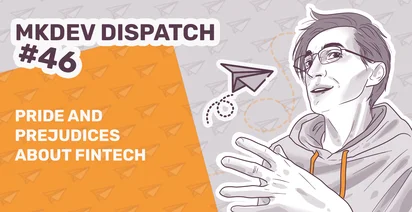Pride and Prejudices about FinTech | ✉️ #46

Hey! 👋
I've attended a FinTech conference last week and was pleasantly surprised. I was sure everyone would be talking about web3.0, crypto, NFTs, and other tokens, patting themselves on the back, celebrating their success, and to an outsider, it would all seem like a scam. Naturally, these turned out to be prejudices that I was happy to break. At FinTech conferences, they don't plan on how to take your money faster and more efficiently. Instead, they discuss the same issues as any other product development. Well, almost. And while I understand that I'm writing this mainly to overcome my own misconceptions, I'm sure this knowledge will be helpful to you too. So, what problems does FinTech face?
First and foremost is regulation. The financial sector is heavily regulated, making it difficult to maneuver. Every misstep results in fines. A mistake can lead to a criminal sentence. We spoke with people whose job title is literally Head of Innovation. And you can imagine what kind of innovations companies can afford when, on one side, regulators are watching them and not allowing them to move forward, and on the other side, financial institutions stuck in the last century are holding them back. Instead of focusing on research and progress, the Head of Innovation has to measure each step by the millimeter and modernize the infrastructure drop by drop. Their job is mostly about prioritization. Hence, the logical result is that FinTech companies achieve the most progress in developing countries, not developed ones.
And do you know who doesn't need to get every step approved by a regulator? That's right, fraudsters. Their progress is racing ahead as they fully utilize modern technology and the research results of those same FinTech companies. It's like a game of tag, only one participant is running without legs and with their hands tied behind their back. In such conditions, cybersecurity becomes paramount. Especially when it comes to integrations. Hearing about the hoops they have to jump through makes you appreciate when your payment goes through in seconds. Oh, and it was also fascinating to hear about how our behavior is analyzed. On average, a company assessing transaction risks has about 700 markers for each user to determine whether you are making the transaction willingly or if something suspicious is happening. Have you noticed that sometimes when you make a payment online, it goes through without any additional checks, and other times three pop up? That's precisely how the system works. I think we will invite a guest to our podcast to talk about all this. Subscribe! :)
And let's touch a bit on AI, because how could we not? The fact that AI tends to hallucinate and frequently lie almost rules out the possibility of its widespread use in FinTech. They talked about attempts to tame language models by introducing additional fact-checkers to verify the information provided by AI. There was even a story where a company ended up with extra payouts it shouldn't have made because a virtual assistant promised customers all sorts of things, and they, not being fools, took those messages to court. A public offer, after all. So, FinTech is being cautious with this. The focus is more on Big Data. But the experiments continue.
That's a brief overview. We'll keep traveling to conferences and learning new things. For example, right now, as you're reading this, Pablo and Jennifer are moving between AWS Summit and South Summit in Madrid. These are more broadly specialized exhibitions, which means even more interesting things are happening there! We'll find out soon :)
What We've Shared
The End of Internet Search as We Know It. Bye Google: Let’s discuss why we’ll see the end of Stack Overflow in the coming months and why Google search needs to change.
LLM can’t replace lawyers, Microsoft beats Apple Sillicon, Google Cloud lets Kinesis in / mknews #6
DevOps Accents #38: Google Gemini & Microsoft Copilot. Why is Google becoming a summary tool? Should you glue your cheese? What future does local AI on device bring? As soon as Kirill has left the building for a week, Pablo and Leo talk AI for 40 minutes: GPT-4o, Gemini and Microsoft Build conference.
And on the website we finish Paul's two-parter! Part 2 dives into the mechanics of relational and vector databases for AI. Discover how combining these tools enhances data retrieval, linking theory to practical solutions for business applications:
What We've Discovered
Building a GitOps CI/CD Pipeline with GitHub Actions (SOC 2): That’s just an excellent starting point for building gitops deployments with GitHub actions!
The Economics of Writing Technical Books: An interesting non-technical article about writing technical books and the economics of it
Terrascan Walkthrough: If Checkov doesn’t please you, here is a guide on using Terrascan, open source tool to analyze your infrastructure code and discover security issues.
How reliability differs between monolithic and microservice-based architectures: A short and straightforward overview of pros and cons of switching to micro services in terms of reliability.
Children of the Magenta: The crash of American Airlines flight 965. A detailed description of an airplane crash from which some lessons can be drawn about for infrastructure engineering work.
An announcement
We're adding mkdev dispatch to LinkedIn Newsletters! If that's more convenient for you than email, subscribe to us there to receive your copy that way starting with issue 47.
The 47th mkdev dispatch will arrive on Friday, June 21st. See you next time!
